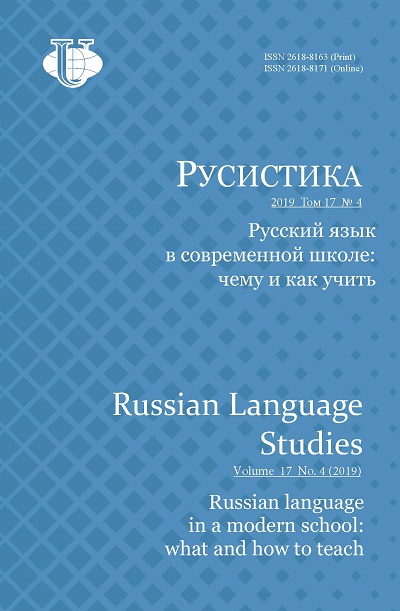Speech behaviour of Latvian Russian-speaking schoolchildren in argumentative texts
- Authors: Gavrilina M.A.1
-
Affiliations:
- Latvian University
- Issue: Vol 17, No 4 (2019): RUSSIAN LANGUAGE IN A MODERN SCHOOL: WHAT AND HOW TO TEACH
- Pages: 428-444
- Section: Methods of Teaching Russian as a Native and Foreign Language
- URL: https://journals.rudn.ru/russian-language-studies/article/view/22433
- DOI: https://doi.org/10.22363/2618-8163-2019-17-4-428-444
- ID: 22433
Cite item
Full Text
Abstract
The article analyses the problems, which Russian-speaking schoolchildren in Latvia meet while creating written argumentative texts. The topicality of the article lies in the peculiarities of forming the schoolchildren’s linguistic personality in the diaspore during bilingual education. The author focuses on the main problems in the schoolchildren’s written speech and their reasons. The criteria of text content-analysis were as follows: 1) the level of argumentation autonomy; 2) the quality of the arguments; 3) the level of argument unfoldedness and using different types of arguments; 4) speech expressiveness and observing language norms. The ninth-graders’ text analysis led the author to the following conclusions: the compositions of most schoolchildren partly correspond with argumentative texts (in the aspect of their contents, structure, quantity and quality of arguments, means of thought development); they lack intertextual embeddings (the texts are “poor” in the sense aspect); in the speech behaviour there dominates an explicit I-communication (reflexive observations, egocentric direction of their behaviour), pragmatic, naked outline of facts even if the topic of the text motivates to verbalize emotions; there are a lot of language errors. The results of the research are based on analysis of 3296 ninth-graders, which the schoolchildren wrote at Russian language exam on finishing secondary school in 2016-2018. The results of this and further researches will allow the author to deeply investigate the process of forming primary and secondary linguistic personality of a Russian-speaking schoolchild in Latvia.
About the authors
Margarita A. Gavrilina
Latvian University
Author for correspondence.
Email: margarita.gavrilina@lu.lv
Doctor of Pedagogical Sciences, Professor
1, Imantas 7 liniya, Riga, LV-1083, LatviaReferences
- Bialystok, E. (2007). Cognitive Effects of Bilingualism: How Linguistic Experience Leads to Cognitive Change. International journal of Bilingual education and bilingualism, 10(3), 210—223.
- Bogin, G.I. (1998). Germenevticheskie posledstviya universalizatsii v metodike prepodavaniya russkogo yazyka kak inostrannogo [Hermeneutics consequences of universalities in a procedure of teaching Russian as a second language]. Hermeneutics in Russia, 2(3), 3—9. (In Russ.).
- Burvikova, E.V. (2012). Russian language in new England: teaching Russian as a foreign language in universities in the United States. Russian language abroad, (1), 116—120. (In Russ.).
- Butakova, L.O. (2016). Language ability and speech competence of schoolchildren: analysis of cognitive mechanisms development. Science Journal of Volgograd State University. Linguistics, 15 (4), 40—52. (In Russ.).
- Dzhalalova, A., Zorina, N., Kostykevich, I., Protasova, E., Bursa, A., Viimaranta, H., Gavrilina, M. & Grigule, L. (2017). The family language policy and bilingual education. Polilingvizm and environment (pp. 8—45). Berlin: Retorika Publ. (In Russ.).
- Gats, I.Yu. (2012). Lingvisticheskoe obrazovanie shkol’nikov v sovremennoi yazykovoi situatsii: monografiya [Linguistic formation of students in a modern language situation: monograph]. Moscow: MGOU Publ. (In Russ.).
- Gats, I.Yu. (2017). Linguistic and Methodic Obstacles in Language Training of Schoolers. Izvestiya of Southern Federal University. Philological sciences, (4), 213—220. Retrieved February 11 2019 from: http://philol-journal.sfedu.ru/index.php/sfuphilol/article/view/1099
- Gavrilina, M. (2018). Izuchenie russkogo (rodnogo, pervogo) yazika v shkolakh Latvii: monografiya [Russian (L1) Language Learning in Schools of Latvia: monograph]. Riga: Macibu gramata Publ. (In Russ.).
- Grosjean, F. (1989). Neurolinguists, beware! The bilingual is not two monolinguals in one person. Brain and Language. 36(1). 3—15.
- Kirilova, V.V. (2008). Formirovanie navykov argumentatsii v ustnoi rechi uchashchikhsya srednikh special’nkyh uchebnykh zavedenii Respubliki Severnaya Osetiya-Alaniya [Formation of skills of the argument in oral speech of pupils of average special educational institutions of Republic Northern Ossetia-Alania]. (Author’s abstr. cand. ped. diss.). Vladikavkaz. Retrieved January 25 2019 from: http://www.dissercat.com/content/formirovanie-navykov-argumentatsii-v-ustnoi-rechiuchashchikhsya-srednikh-spetsialnykh-ucheb
- Mamaeva, S.V. (2007). Rechevoi portret kollektivnoi yazikovoi lichnosti shkol’nikov 5—7 klassov [Speech portrait of the collective language person of students of 5—7 grades]. (Candidate dissertation, Lesosibirsk). Retrieved January 14 2019 from: https://search.rsl.ru/ru/record/01003345621
- Mlechko, T.2 (2012). Russkaya yazikovaya lichnost’ v sotsiokulturnom izmerenii novoi diaspory [The Russian language person in sociocultural measurement of new diaspora], (2), 30—35. Slovo.ru: Baltiiskii accent Publ. (In Russ.).
- Mlechko, T.P.1 (2012). Individual Cognitive space of the Russian-speaking Personality in the New Identity abroad. Russian language abroad, (1), 58—64. (In Russ.).
- Nazarova, L.A. (2014). Basic forms of Teenage Verbal Aggression. Philological sciences. Questions of the theory and practice, 4(34), 155—157. (In Russ.).
- Overbeke, M. (1972). Introduction au problem du bilinguisme. Langues et Culture, 7. Bruxelles: Labor, Paris, F. Nathan Publ. (In French).
- Panov, M.V. (1990). Istoriya russkogo literaturnogo proiznosheniya VIII—XIX vv. [History of the Russian literary pronunciation of VIII—XIX centuries]. Moscow: Nauka Publ. (In Russ.).
- Protasova, E. (2005). Kak formiruyutsya yazyki, kogda ikh — dva? [How languages develop, when there are two of them?]. Retrieved January 19 2019 from: http://gramota.ru/biblio/magazines/gramota/ education/28_523
- Protasova, E. (2017). Connection between polilingvizm and environment. Polilingvizm and environment (pp. 4—7). Berlin: Retorika Publ. (In Russ.).
- Schoonen, R., van Gelderen, A., Stoel, Reinoud, D., Hulstijn, J. & de Glopper, С. (2011). Modeling the Development of L1 and EFL Writing Proficiency of Secondary School Students. Language Learning, 61(1,03). 31—79.
- Skola2030. (2018). Мācību priekšmetu standarti [School subjects curriculum]. Retrieved February 11 2019 from: https://www.skola2030.lv/single-post/2018/10/12/Izskat%C4%AB%C5%A1anaivald%C4%ABb%C4%81-iesniegts-pamatizgl%C4%ABt%C4%ABbas-standarta-projekts
- Sobkin, I.S. & Tkachenko, O.V. (2004). “Culture”of speech of the modern teenager. Elementary school before and after. Retrieved January 9 2019 from: http://school2100.com/upload/iblock/44f/44f2 155210f7cd26203f51f641b40e7b.pdf
- Vasilenko, T.V. (2015). School Essay under the Conditions of Information Society. Media. Information. Communication. 5. Retrieved January 4 2019 from: http://mic.org.ru/15-nomer-2015/532shkolnoe-sochinenie-v-usloviyakh-informatsionnogo-obshchestva
- Vygotskii, L.S. (1960). Razvitie vysshikh psikhicheskikh funktsii [Development of Higher Psychical functions]. Retrieved February 19 2019 from: http://www.al24.ru/pdf_kniga_15474.html
- Zakharchenko, T. (2009). Angliiskii i amerikanskii sleng [English and American slang]. Moscow: АСЕ Publ. (In Russ.).
Supplementary files














